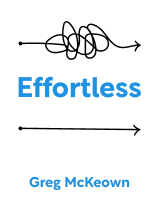

This article is an excerpt from the Shortform book guide to "Effortless" by Greg McKeown. Shortform has the world's best summaries and analyses of books you should be reading.
Like this article? Sign up for a free trial here.
Do you want to live an easy, effortless life without stress and worry? What are some things you can do to de-stress your life?
No matter how productive or successful you are, there are always ways to make life easier for yourself. By taking the easiest path, you can be healthier, happier, and more productive.
Here’s how to make your life easier by implementing the Effortless principles.
Effortless: Make It Easier to Do What Matters Most
In Effortless, business strategist and public speaker Greg McKeown gives advice on how to make your life easier and less stressful. In our professional and personal lives, we’re often taught that to achieve results, we must work as hard as we possibly can. McKeown says that it doesn’t have to be this way. What if we instead found easier routes to success and integrated them into our lives? In Effortless, McKeown explains how to do just that.
Make Things Automatic
To make things easier on yourself, McKeown recommends automating as many essential tasks in your life as possible. Automating tasks helps you avoid forgetting important things and can make the complexities of life more manageable. Write down important meetings on a calendar. Set up automatic payments for bills and other recurring payments. If a job requires you to perform a complex task, make a checklist of all the things you need to do. You have access to information, technology, and procedures to make our lives easier. Use them.
(Shortform note: In Getting Things Done, which also looks at the importance of automating tasks, David Allen gives three main reasons modern culture requires more extensive automation. First, employees are often asked to work outside of the normal eight-hour, in-office schedule. Work takes up much more space and time in people’s lives. Second, most work today is more abstract than in the industrial jobs of the past. The tasks we’re asked to complete are more numerous and less clearly defined. Third, people today are in constant communication, adding more work to our already full schedules.)
Solve Problems Before They Arise
McKeown argues that it’s much more cost-effective to solve or prevent a problem than to contain it. No matter how small or insignificant a problem may seem, if you fix it, you’ll save yourself a lot of time and effort in the long run. Patch your leaky tire instead of adding air every week. Fix the wobbly desk rather than deal with the daily annoyance. Get in the habit of fixing issues, and you’ll make things much easier on yourself.
While fixing problems is helpful, McKeown reminds us that taking the time to prevent them can save you even more trouble. While this may seem obvious, people have trouble recognizing how the things they’re doing today might impact them in the future. McKeown advises looking for ways to prevent issues from arising. This approach can be applied to problems large and small. Live an active lifestyle and you’re much less likely to suffer health problems later in life. Put felt protectors on your furniture and you won’t damage your floor. Ask yourself: What can I do today to help myself tomorrow?
of this notion will help you produce more with less effort.
Build and Maintain Trustful Relationships
In our personal and professional lives, we rely on others. So how can we make our relationships easier to manage? McKeown’s answer to this is trust. Relationships built on trust will take much less effort than those that aren’t. In a workplace, a team that trusts each other will be much more productive. In a personal relationship, trust makes maintaining a healthy and happy bond easier. Therefore, the first thing to do is to simply surround yourself with trustworthy people. As a boss, hire people you feel you can rely on. When choosing a friend or romantic partner, prioritize trustworthiness.
Even if we try to surround ourselves with trustworthy people, there will always be times when a lack of trust arises in our relationships. McKeown argues that while people usually blame each other for a lack of trust, it’s often the structure of the relationship that’s to blame. When people have different expectations for a relationship, their goals don’t match, or their roles aren’t clearly defined, the relationship can become distrustful.
To avoid this breakdown of trust, build a strong foundation from the beginning. In our personal lives, this can just mean being open and upfront about how we feel and what we want and expect from one another. In the professional world, building a foundation of trust means clearly defining collective goals and personal responsibilities, as well as properly incentivizing employees when they meet these goals and responsibilities.

———End of Preview———
Like what you just read? Read the rest of the world's best book summary and analysis of Greg McKeown's "Effortless" at Shortform.
Here's what you'll find in our full Effortless summary:
- Why you don't need to hustle and burn out to achieve your goals
- Why the easiest path to success is the most viable
- Actionable advice for how to achieve effortless success in life






